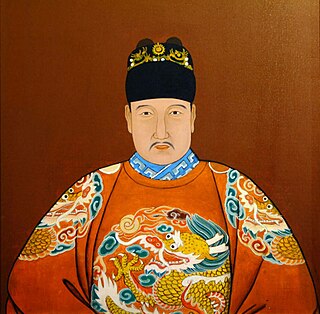
Zhu Biao was the Hongwu Emperor's eldest son and crown prince of the Ming dynasty. His early death created a crisis in the dynasty's first succession that was resolved by the successful usurpation of his brother Zhu Di as the Yongle Emperor, an act with far-reaching consequences for the future of China.

Zhu Quan, Prince of Ning was a Chinese historian, military commander, musician, and playwright. He was the 17th son of the Hongwu Emperor of the Ming dynasty. During his life, he served as a military commander, feudal lord, historian, and playwright. He is also remembered as a great tea connoisseur, a zither player, and composer.

The princes of the Ming dynasty were titled and salaried members of the imperial bureaucracy with nominal lordship over various fiefs of Ming China. All were members of the imperial Zhu clan descended from the twenty-six sons of Zhu Yuanzhang. None of the princes controlled the administration of their nominal fief, unlike some tribal leaders or Confucius' descendants, the Dukes of Overflowing Sagacity, who continued to rule their territories outside of the normal provincial system.
Zhu Shouqian, Prince of Jingjiang, was the grandnephew of Zhu Yuanzhang. His grandfather, Zhu Xinglong was the eldest brother of the Hongwu Emperor, while his father was Zhu Wenzheng, who had helped the Hongwu Emperor found the Ming dynasty.
Prince of Qin was a first-rank princely peerage of the Ming dynasty. The princedom was created by the Hongwu Emperor for his second son, Zhu Shuang.
Zhu Hengjia was the 12th Prince of Jingjiang. He was a 10th generation descendant of Zhu Shouqian, 12th descendant of Zhu Xinglong, brother of the Hongwu Emperor. His son was Shitao, who was a Chinese landscape painter and poet during the early part of the Qing dynasty. He had claiming himself as regent of the Ming dynasty but was later defeated.
Prince of Gui, was a first-rank princely peerage used during Ming dynasty, this peerage title was created by Wanli Emperor. The first Prince of Gui was Zhu Changying, 7th son of Wanli Emperor. This peerage had 6 cadet commandery princely peerages, all of these second-rank peerages had not inherited. The last Southern Ming emperor, Zhu Youlang was a member of this peerage.
Prince of Qi was a first-rank princely peerage of the Ming dynasty created by the Hongwu Emperor. The first Prince of Qi was Zhu Fu, 7th son of the Hongwu Emperor. He was made the principality by his father in 1370. The peerage later abolished by the Jianwen Emperor in 1399, and abolished again by the Yongle Emperor in 1406 after the re-creation of 1403. After Zhu Yujian enthroned as the Longwu Emperor of the Southern Ming, he posthumously restored Zhu Fu's princely title and princedom. The Chongzhen Emperor also posthumously bestowed 3rd son of his father, the Taichang Emperor, Zhu Youji (朱由楫) under the title of Prince of Qi.
Prince of Xing, was a first-rank princely peerage used during Ming dynasty, the principality was created by Chenghua Emperor for his fourth son, Zhu Youyuan. As Zhu Youyuan only survived son, Zhu Houcong was enthroned as Jiajing Emperor, the principality was absorbed into the crown.
Prince of Fu, was a first-rank princely peerage used during Ming dynasty, this peerage title was created by Wanli Emperor. The first Prince of Fu was Zhu Changxun, 3rd son of Wanli Emperor. This peerage had 2 cadet commandery princely peerages, all of these second-rank peerages had not inherited. The first Southern Ming emperor, Zhu Yousong was the last title holder of this peerage.
Prince of Yi, was a first-rank princely peerage used during Ming dynasty, it was created by Chenghua Emperor for his sixth son, Zhu Youbin.
Prince of Han, was a first-rank princely peerage used during Ming dynasty, this princedin initially was created by Hongwu Emperor for his 14th son, Zhu Ying, but h's designation later changed to Prince of Su. This princedom later created again by Yongle Emperor for his secondson, Zhu Gaoxu. The princedom later abolished by Xuande Emperor after the Gaoxu Rebellion.
Prince of Zhao, was a first-rank princely peerage used during Ming dynasty, this peerage title initially was created by Hongwu Emperor for his ninth son he was deceased. The princedom later created again by Yongle Emperor and was held by Zhu Gaosui, 3rd son of Yongle Emperor.
Zhu Gui, initially known by his title as Prince of Yu, later changed to Prince of Dai (代王), was an imperial prince of the Chinese Ming dynasty. He was the 13th son of Hongwu Emperor with his concubine, Consort Hui.
Princedom of Jin (晋王) was a princely peerage created by Hongwu Emperor for his third son, Zhu Gang.
Prince of Chu peerage (楚王) was created in 1370 for Zhu Zhen, Hongwu Emperor's sixth son by Consort Chong of the Hu clan. Initially the peerage was named as Prince of Qi, however the name was changed to Chu after the ancient Chinese kingdom that used to encompass Wuchang, which was conquered at the time of Zhu Zhen's birth.
Prince of Lu (鲁王) is a Ming dynasty princely peerage created in 1370 for Zhu Tan, Zhu Yuanzhang's tenth son by consort Ning, of the Guo clan.The fief of Prince of Lu was located in Yanzhou prefecture (兖州府) since 1385.
Zhu Shangbing, formally known as Prince of Qin (秦王), was a chinese prince of the Ming Dynasty. He was the son of Zhu Shuang and the grandson of Hongwu Emperor.
Prince of Dai (代王) was a Ming dynasty princely peerage created by Zhu Yuanzhang for his 13th son, Zhu Gui, in 1378. The peerage was initially named Prince of Yu (豫王) with the fief in Nanchang. In 1392, the peerage gained its actual name, hence the fief was relocated to Datong (大同), one of the nine strategically important cities of Ming Dynasty China since 1487.


